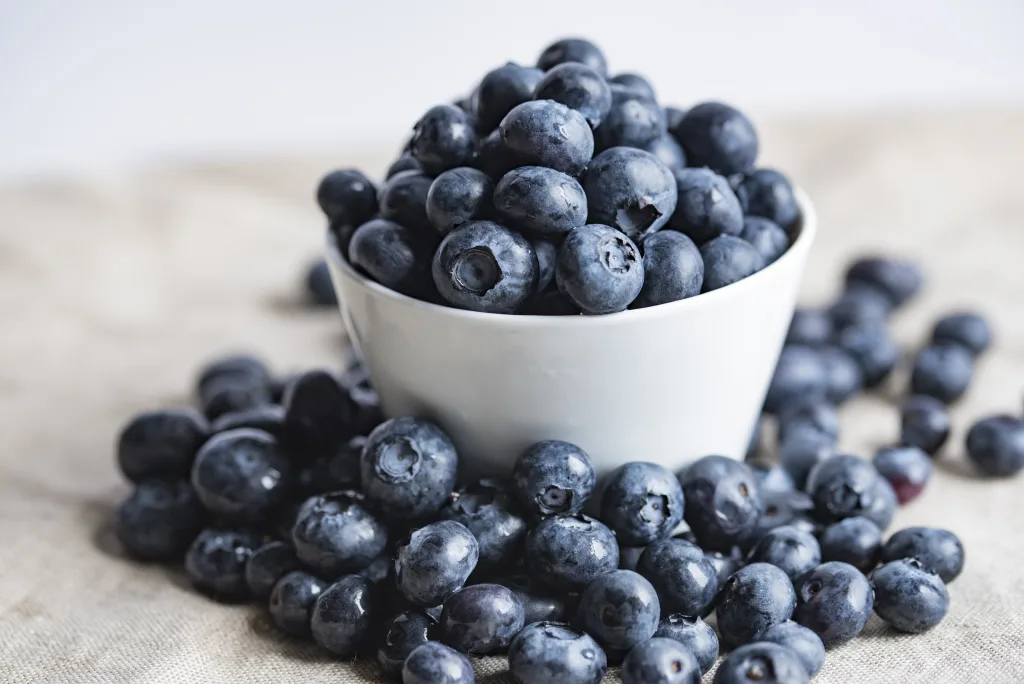Are blueberries acidic? The short answer is yes. Blueberries are slightly acidic, with a pH value ranging from 3.12 to 3.33 on the pH scale. However, this acidity level is low enogh that it doesn’t trigger heartburn and acid reflux unless consumed in large quantities.
Blueberries are a great source of vitamins, minerals, and antioxidants. Not only are they delicious, but they can also help to boost your immune system, reduce inflammation, and even aid in weight loss. But for those who suffer from conditions such as IBS or fructose malabsorption or intolerance due to their high fructose content, eating too many blueberries can case digestive discomfort such as bloating.
If you’re looking for ways to balance the acidity of blueberries without reducing their nutritional benefits, there are several options available. Adding them to salads or smoothies with othr ingredients can help to reduce their perceived acidity while still providing you with all of their health benefits. For example, try adding blueberries to an apple-banana-strawberry smoothie for a delicious and healthy way to enjoy the health benefits of blueberries without triggering any digestive discomfort.
In conclusion, while blueberries are slightly acidic they are safe to enjoy in moderation as part of a balanced diet. However if you suffer from certain digestive conditions it may be best to limit your consumption or combine them with other ingredients such as fruits and vegetables in order to reduce their perceived acidity and prevent any digestive discomfort caused by the high fructose content found in these berries.
The Acidity of Blueberries
Blueberries have a low pH value and are considered to be one of the more acidic fruits. However, they are not as acidic as some other fruits like oranges or lemons. While consuming blueberries in high quantities may cause heartburn or acid reflux, they can generally be enjoyed in moderation without any negative effects. To balance out their acidity, try combining blueberries with other ingredients in salads and smoothies.

Can Blueberries Be Consumed with Acid Reflux?
Yes, you can eat blueberries if you have acid reflux. Blueberries are considered a non-citrus fruit, so they are usually safe for those with acid reflux. Additionally, blueberries are high in antioxidants and fiber, both of wich can help protect against symptoms of acid reflux. However, it is important to note that everyone’s body responds differently to certain foods, so what works for some may not work for others. To be safe, it is always best to talk to your doctor or nutritionist before making any changes to your diet.
The Effects of Blueberries on Digestion
Blueberries can be hard on your stomach if you have Irritable Bowel Syndrome (IBS) or a fructose intolerance or malabsorption. If you have one of these conditions, eating too many blueberries can lead to bloating, abdominal pain, and other digestive discomfort. In general, it is best to consult with your doctor beore changing or increasing your consumption of any high-fructose food, including blueberries.
Non-Acidic Fruits
Bananas are a non-acidic fruit, making them well-suited for those with acid reflux. They contain a low level of acidity and have a pH of around 5. They are also rich in fiber, making them an excellent choice for those with digestive issues. Other non-acidic fruits include apples, pears, papayas, mangos, grapes, pineapples, raspberries and blueberries. Regardless of which non-acidic fruit you choose, it is important to keep portions moderate as high amounts of any one food can cause problems with digestion.
The Effects of Eating Too Much Acidic Fruit
Citrus fruits, such as lemons, limes, grapefruits, and oranges, are known to have high levels of acidity. While consuming these fruits in moderation can be beneficial to your health, eating too much of them can cause digestive distress and lead to other problems. The acidity level of citrus fruits is determined by ther pH level; the lower the pH level is, the more acidic the fruit is. Other acidic fruits include plums, grapes, blueberries, pineapples and tomatoes. Eating too many acidic fruits can cause stomach pain and discomfort. Thus it’s important to eat these fruits in moderation and balance out your diet with other nutritious foods.

Fruits to Avoid with Acid Reflux
If you suffer from acid reflux, it’s important to be aware of which fruits can worsen your symptoms. Fruits that are high in acid content, such as oranges, grapefruits, lemons, limes, tomatoes and pineapple should all be avoided if you have GERD. Tomatoes and tomato sauce should also be avoided due to their high acidity levels. Additionally, foods that use tomato sauce such as pizza and chili may trigger symptoms of reflux. Lastly, salsa should also be avoided for the same reason. Therefore, it is best to avoid these fruits if you suffer from GERD in order to prevent painful symptoms and reduce the risk of futher digestive issues.
Fruits to Avoid with Acid Reflux
Fruits that are high in acidity, like lemons, oranges, and limes, can exacerbate symptoms of acid reflux. Citrus fruits and juices such as grapefruit, orange juice, tomato juice, and pineapple juice can also cause unpleasant symptoms for those with GERD. Additionally, apples, cranberries, and other acidic fruits should be avoided. Other fruits that may not be ideal for those with GERD include kiwi and strawberries. Eating these fruits in moderation is generally considered safe but it could still result in heartburn depending on the individual.
Foods to Reduce Stomach Acid
The best foods to reduce stomach acid are those that are non-acidic and high in fiber. Whole grains such as oatmeal, couscous, and brown rice, root vegetables like sweet potatoes, carrots, and beets, and green vegetables such as asparagus, broccoli, and green beans are all great options for helping to reduce stomach acid. It’s also important to avoid foods that can increase stomach acid production like citrus fruits, spicy foods, tomatoes and tomato sauces, caffeine-containing beverages like coffee and tea, alcoholic drinks, processed meats like bacon or sausage, chocolate and fried foods. Additionally, eating smaller meals more frequently throughout the day may help reduce symptoms of acid reflux.
Side Effects of Eating Blueberries
The potential side effects of eating blueberries are minimal. While there have been isolated reports of allergic reactions, these are rare and generally mild. The most common symptom is an itchy mouth or throat. In addition, some people may experience digestive upset or nausea if they consume too many blueberries at once.
It is worth noting that blueberries can also have a lowering effect on blood pressure and blood sugar levels. If you take medication to control your blood pressure or diabetes, it is best to speak to your doctor before eating large amounts of blueberries as this could interfere with the effectiveness of the medication.
Overall, when eaten in moderation, blueberries provide numerous health benefits without any significant side effects. They are a great source of antioxidants, fiber and vitamins which can help improve overall health and wellbeing.
The Effects of Blueberries on Gut Health
Blueberries do not ‘clean’ your gut, but they can help promote healthy digestion and fight inflammation. They are an excellent source of prebiotics, whih are dietary fibers that feed the good bacteria in your gut and help create an environment for them to thrive. Prebiotics also act as a natural detoxifier, working to remove toxins from the digestive tract. Blueberries contain 14% of the recommended daily value (RDV) of fiber per 150g serving, which helps move waste through the digestive system and aids in regular bowel movements. In addition, blueberries are high in antioxidants, which help reduce inflammation and support a healthy balance of gut microbes. All of these properties make blueberries a great choice for supporting a healthy gut microbiome.
Are Blueberries Gentle on the Stomach?
Yes, blueberries are generally gentle on the stomach. This is because they lack complex carbohydrates, which some people find difficult to digest. Blueberries are also high in dietary fiber, which can help to soothe digestive issues. Additionally, blueberries contain vitamins and minerals that can aid digestion and reduce inflammation in the gut. Furthermore, many studies have found that compounds found in blueberries may help to reduce symptoms associated with irritable bowel syndrome and other gastrointestinal issues.
Berries With the Lowest Acidic Levels
Blackberries, raspberries, and strawberries are generally considered to be the least acidic of all types of berries. They have a lower pH level than other fruits, such as oranges or lemons, which makes them less likely to cause acid reflux. These berries also offer a variety of vitamins and minerals, and are a great source of antioxidants. Additionally, they are low in sugar but high in fiber, making them an excellent choice for those looking to maintain a healthy weight.
Lowering the PH of Blueberries
Lowering the pH of blueberry soil is an important step in ensuring healthy, productive plants. To achieve this, you can add granular sulfur to the soil. For evey fifty feet (15 m.) of soil, add 1 pound (0.50 kg.) of granular sulfur. The amount of sulfur needed may vary depending on the existing pH level and soil type. This will help to lower the pH one point.
It’s important to remember that too much sulfur can be harmful for blueberries, so it’s best to start with smaller amounts and work up as needed. It’s also beneficial to test your soil’s pH level before adding sulfur as well as after adding it, so you can ensure that you’ve achieved the desired results.
Are Bananas an Acidic Fruit?
Bananas are not considered to be acidic. They have a pH of about 5.5, which is slightly alkaline, meaning it is higher than 7 on the pH scale. Bananas are a great source of vitamins and minerals, such as vitamin B6, vitamin C, potassium, magnesium and fiber. They also contain natural sugars that make them sweet and tasty. Bananas can help with digestion, boost energy levels and provide a healthy snack option between meals. Eating bananas may help reduce symptoms of acid reflux becuse they are low in acidity and high in fiber content. Therefore, they can help protect the lining of your stomach from the effects of acidity.
Conclusion
In conclusion, blueberries are acidic with a pH value that ranges from 3.12 to 3.33. While they can be consumed on an acid reflux diet, it is important to note that the fructose in blueberries can cause digestive discomfort if eaten in large quantities or if you have a specific intolerance or malabsorption issue. As a result, it is wise to be moderate when consuming blueberries and also include other non-citrus fruits in your diet for balance.
